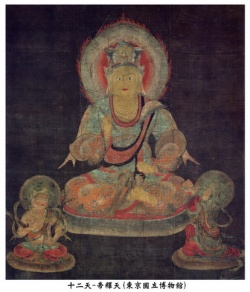Difference between revisions of "Shakra"
(Created page with "thumb|250px| <poem> '''Shakra''' [帝釈] (Skt; Jpn Taishaku) Also known as Shakra Devanam Indra, or simply Indra. The lord or king o...") |
|||
| (2 intermediate revisions by the same user not shown) | |||
| Line 1: | Line 1: | ||
[[File:Shakra_Devanam_Indra.jpg|thumb|250px|]] | [[File:Shakra_Devanam_Indra.jpg|thumb|250px|]] | ||
<poem> | <poem> | ||
| − | + | [[Shakra]] | |
| − | [帝釈] (Skt; Jpn Taishaku) | + | [[帝釈]] (Skt; Jpn [[Taishaku]]) |
| − | Also known as Shakra Devanam Indra, or simply Indra. The lord or king of gods in early Vedic and Hindu belief, and one of the two principal protective gods of Buddhism, the other being Brahma. The Sanskrit word shakra means powerful. Indra was originally the god of thunder in Vedic mythology, and Shakra was one of his many titles. Buddhist texts adopted Shakra as his primary name, though the name Indra also appears. He is also one of the twelve gods of Esoteric Buddhism said to protect the world. Residing in a palace called Joyful to See in the Heaven of the Thirty-three Gods on the summit of Mount Sumeru and served by the four heavenly kings, he is said to govern the other thirty-two gods of that heaven. Shakra is depicted in many sutras as testing Buddhist practitioners' resolve. This he often does by assuming various forms, such as that of a Brahman or a demon. The Jataka and other scriptures depict him as testing Shakyamuni when the latter was engaged in bodhisattva practices in previous lifetimes. According to the "Introduction" (first) chapter of the Lotus Sutra, he took part in the assembly on Eagle Peak at which the sutra was preached, with twenty thousand retainers accompanying him. Shakra Devanam Indra means "Shakra, the Indra of the Gods," i.e., "Shakra, the Lord of the Gods." Buddhist scriptures also refer to him as Kaushika. | + | Also known as [[Shakra]] {{Wiki|Devanam}} {{Wiki|Indra}}, or simply {{Wiki|Indra}}. The [[lord]] or [[king]] of [[gods]] in early {{Wiki|Vedic}} and {{Wiki|Hindu}} [[belief]], and one of the two [[principal]] protective [[gods]] of [[Buddhism]], the other {{Wiki|being}} [[Brahma]]. The [[Sanskrit]] [[word]] [[shakra]] means {{Wiki|powerful}}. {{Wiki|Indra}} was originally the [[god]] of {{Wiki|thunder}} in {{Wiki|Vedic}} {{Wiki|mythology}}, and [[Shakra]] was one of his many titles. [[Buddhist]] texts adopted [[Shakra]] as his [[primary]] [[name]], though the [[name]] {{Wiki|Indra}} also appears. He is also one of the twelve [[gods]] of [[Esoteric Buddhism]] said to {{Wiki|protect}} the [[world]]. Residing in a palace called [[Joyful to See]] in the [[Heaven of the Thirty-three Gods]] on the summit of [[Mount Sumeru]] and served by the [[four heavenly kings]], he is said to govern the other [[thirty-two gods]] of that [[heaven]]. [[Shakra]] is depicted in many [[sutras]] as testing [[Buddhist]] practitioners' resolve. This he often does by assuming various [[forms]], such as that of a {{Wiki|Brahman}} or a {{Wiki|demon}}. The [[Jataka]] and other [[scriptures]] depict him as testing [[Shakyamuni]] when the latter was engaged in [[bodhisattva]] practices in previous lifetimes. According to the "Introduction" (first) chapter of the [[Lotus Sutra]], he took part in the assembly on {{Wiki|Eagle Peak}} at which the [[sutra]] was {{Wiki|preached}}, with twenty thousand retainers accompanying him. [[Shakra]] {{Wiki|Devanam}} [[Indra]] means "[[Shakra]], the {{Wiki|Indra}} of the [[Gods]]," i.e., "[[Shakra]], the [[Lord]] of the [[Gods]]." [[Buddhist]] [[scriptures]] also refer to him as [[Kaushika]]. |
</poem> | </poem> | ||
{{R}} | {{R}} | ||
[http://www.sgilibrary.org/search_dict.php?SearchSelect=dict&p=3&m=1&in=2&q=Heaven www.sgilibrary.org] | [http://www.sgilibrary.org/search_dict.php?SearchSelect=dict&p=3&m=1&in=2&q=Heaven www.sgilibrary.org] | ||
| − | [[Category: | + | [[Category:Shakra]] |
| − | |||
Latest revision as of 00:31, 29 January 2014
Shakra
帝釈 (Skt; Jpn Taishaku)
Also known as Shakra Devanam Indra, or simply Indra. The lord or king of gods in early Vedic and Hindu belief, and one of the two principal protective gods of Buddhism, the other being Brahma. The Sanskrit word shakra means powerful. Indra was originally the god of thunder in Vedic mythology, and Shakra was one of his many titles. Buddhist texts adopted Shakra as his primary name, though the name Indra also appears. He is also one of the twelve gods of Esoteric Buddhism said to protect the world. Residing in a palace called Joyful to See in the Heaven of the Thirty-three Gods on the summit of Mount Sumeru and served by the four heavenly kings, he is said to govern the other thirty-two gods of that heaven. Shakra is depicted in many sutras as testing Buddhist practitioners' resolve. This he often does by assuming various forms, such as that of a Brahman or a demon. The Jataka and other scriptures depict him as testing Shakyamuni when the latter was engaged in bodhisattva practices in previous lifetimes. According to the "Introduction" (first) chapter of the Lotus Sutra, he took part in the assembly on Eagle Peak at which the sutra was preached, with twenty thousand retainers accompanying him. Shakra Devanam Indra means "Shakra, the Indra of the Gods," i.e., "Shakra, the Lord of the Gods." Buddhist scriptures also refer to him as Kaushika.
